How to avoid falling for scams like "Facebook Page Has Infringed Copyright Information"
Phishing/ScamAlso Known As: Facebook Page Has Infringed Copyright Information smishing scam
Get free scan and check if your device is infected.
Remove it nowTo use full-featured product, you have to purchase a license for Combo Cleaner. Seven days free trial available. Combo Cleaner is owned and operated by RCS LT, the parent company of PCRisk.com.
What kind of scam is "Facebook Page Has Infringed Copyright Information"?
We have identified this as a fraudulent scheme designed to obtain sensitive information. Perpetrators behind this scam deploy deceitful SMS and Facebook messages, luring users to open a misleading page and disclose their Facebook login credentials. It is strongly advised to disregard these messages and promptly report them.
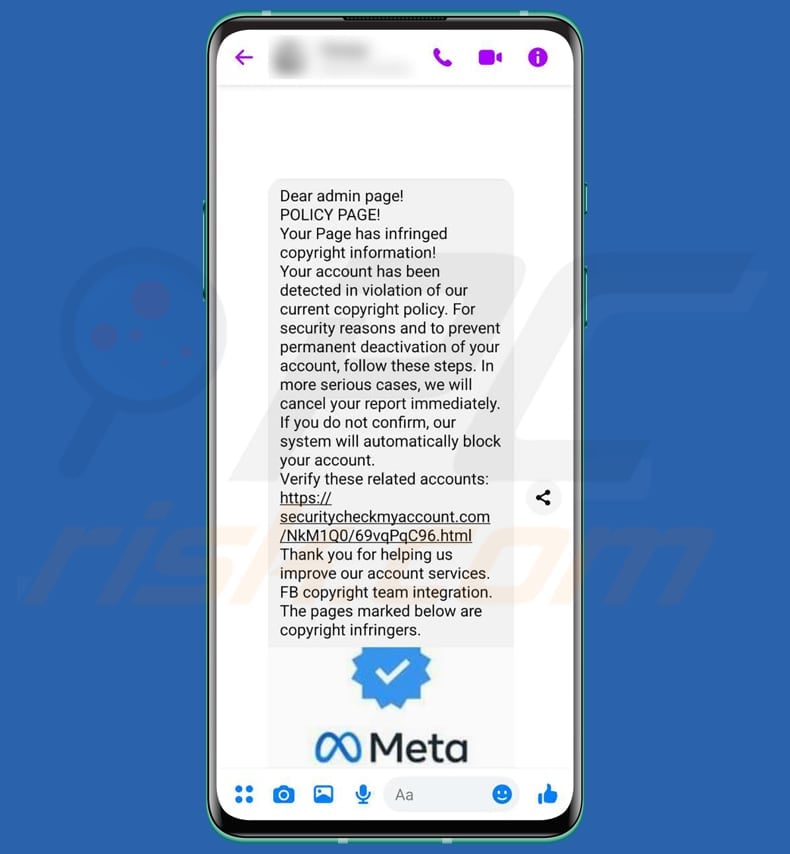
More about the "Facebook Page Has Infringed Copyright Information" scam
The message utilized in this scam begins with a greeting addressed to the recipient as the "admin page". It claims to be a notice regarding a policy violation, asserting that the recipient's page has allegedly infringed upon copyright information.
The message further alleges that the account has been detected for violating the current copyright policy, emphasizing security concerns and the risk of permanent deactivation. In order to resolve the purported issue, the recipient is instructed to follow specified steps.
Failure to comply is threatened with the automatic blocking of the account. The message includes a link presented as a verification step for related accounts. The provided link directs users to a deceptive page that prompts them to input their email address or phone number along with their password for Facebook login
Upon submission, the provided information is transmitted to malicious actors, enabling them to gain unauthorized access to and pilfer Facebook accounts. Once in possession of login credentials, scammers can exploit the compromised accounts in various ways.
They may commit identity theft, leveraging personal information stored on their Facebook profiles to impersonate legitimate account holders. Furthermore, scammers can misuse the compromised accounts to disseminate phishing schemes, spreading malware or deceptive content to the victim's network.
The stolen accounts may also be used for social engineering attacks, where scammers manipulate the account holder's relationships to extract sensitive information or gain access to other online platforms. In essence, the theft of Facebook accounts opens avenues for a range of malicious activities, posing a significant threat to both the account holders and their social circles.
| Name | Facebook Page Has Infringed Copyright Information Scam |
| Threat Type | Smishing, Phishing, Scam, Social Engineering, Fraud |
| Fake Claim | The recipient has infringed copyright |
| Related Domains | digitalenforcementleadgenius.vercel[.]app, meta-complaint-misconduct.pages[.]dev, account.metasystemhelp[.]com, securitycheckmyaccount[.]com, static-fbcdn[.]net, direct-business-support[.]com, page-support-centre[.]net, advert-for-business[.]com, cyber-charm[.]com, livechat.appeal-meta-support[.]com |
| Detection Names (securitycheckmyaccount[.]com) | Avira (Phishing), CRDF (Malicious), CyRadar (Malicious), Fortinet (Phishing), Sophos (Phishing), Full List Of Detections (VirusTotal) |
| Detection Names (static-fbcdn[.]net) | Avira (Phishing), Combo Cleaner (Phishing), Certego (Phishing), Kaspersky (Phishing), Sophos (Malware), Full List Of Detections (VirusTotal) |
| Disguise | Warning from Facebook |
| Symptoms | Unauthorized access to Facebook account, unauthorized purchases, changed online account passwords, identity theft, and more. |
| Distribution methods | SMS, Facebook messages, deceptive websites. |
| Damage | Loss of sensitive private information, monetary loss, identity theft. |
| Malware Removal (Windows) |
To eliminate possible malware infections, scan your computer with legitimate antivirus software. Our security researchers recommend using Combo Cleaner. Download Combo CleanerTo use full-featured product, you have to purchase a license for Combo Cleaner. 7 days free trial available. Combo Cleaner is owned and operated by RCS LT, the parent company of PCRisk.com. |
Similar scam emails in general
Phishing and smishing scams share a common goal of deceiving individuals into divulging sensitive information, such as passwords, financial details, or personal data. These scams typically employ deceptive communication, often through emails, messages, or websites that appear legitimate, mimicking trusted entities like banks, social media platforms, or government agencies.
They exploit psychological tactics, such as urgency or fear, to manipulate recipients into taking immediate action. Additionally, phishing attempts commonly involve misleading links that redirect users to fraudulent sites designed to capture sensitive information.
Examples of phishing campaigns are "Bittrex Email Scam", "Your Password Is Due For Renewal Email Scam", and "DHL - Incoming Shipment Notification Email Scam". It is important to be aware that emails, SMS messages, or other communications can be used to deliver malware.
How do smishing and similar campaigns infect computers?
Scammers often include links in messages that lead to fraudulent websites. Clicking on these links may trigger the download of malware onto the user's device. The malware can range from ransomware to keyloggers, enabling attackers to steal sensitive information, encrypt files, or perform other malicious activities.
Also, fraudulent messages can include attachments that, when opened, execute malicious code on the user's computer. In the case of Facebook, attackers might use compromised accounts to share links that, when clicked, lead to websites with drive-by download capabilities.
How to avoid installation of malware?
Users should exercise caution when interacting with emails, messages, or social media links, avoiding clicking on suspicious or unexpected attachments and links. Also, regularly updating operating systems and software helps patch vulnerabilities that could be exploited by malware.
Additionally, it is strongly recommended not to download pirated software, click ads on shady pages, or use third-party downloaders, P2P networks, and similar channels to obtain software. Lastly, it is advisable to utilize reputable antivirus or anti-malware software and perform regular system scans.
If you have already opened malicious attachments, we recommend running a scan with Combo Cleaner Antivirus for Windows to automatically eliminate infiltrated malware.
Cyber criminals promoting "Facebook Page Has Infringed Copyright Information" scam via SMS:
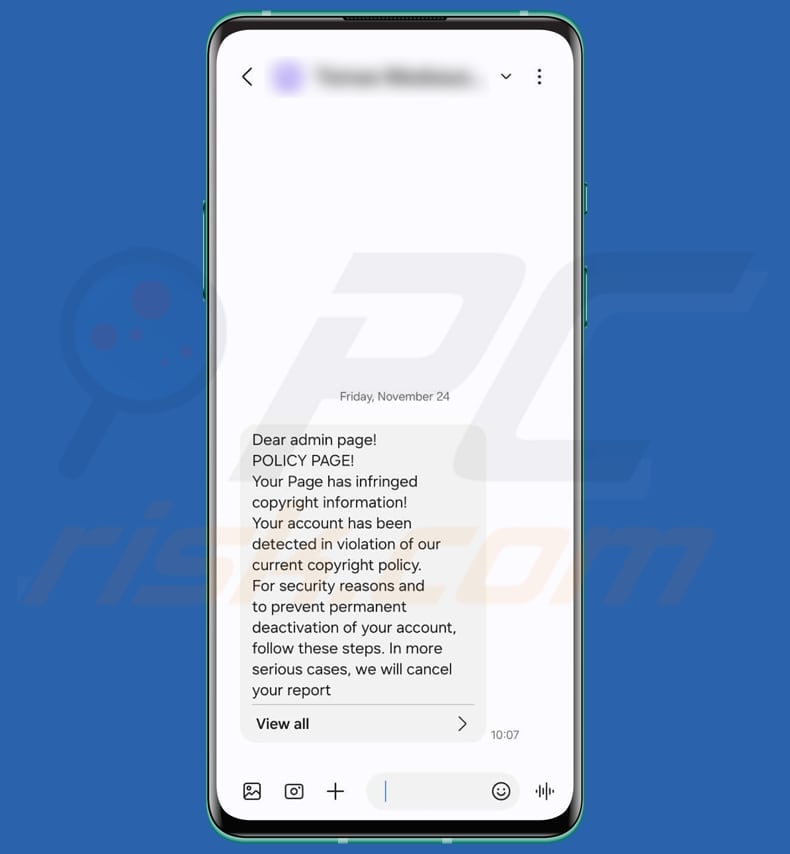
Text presented in the "Facebook Page Has Infringed Copyright Information" message:
Dear admin page!
POLICY PAGE!
Your Page has infringed copyright information!
Your account has been detected in violation of our current copyright policy. For security reasons and to prevent permanent deactivation of your account, follow these steps. In more serious cases, we will cancel your report immediately. If you do not confirm, our system will automatically block your account.
Verify these related accounts: hxxps://securitycheckmyaccount[.]com/*******
Thank you for helping us improve our account services.
FB copyright team integration.
The pages marked below are copyright infringers.
The appearance of the deceptive page used to steal Facebook accounts (GIF):
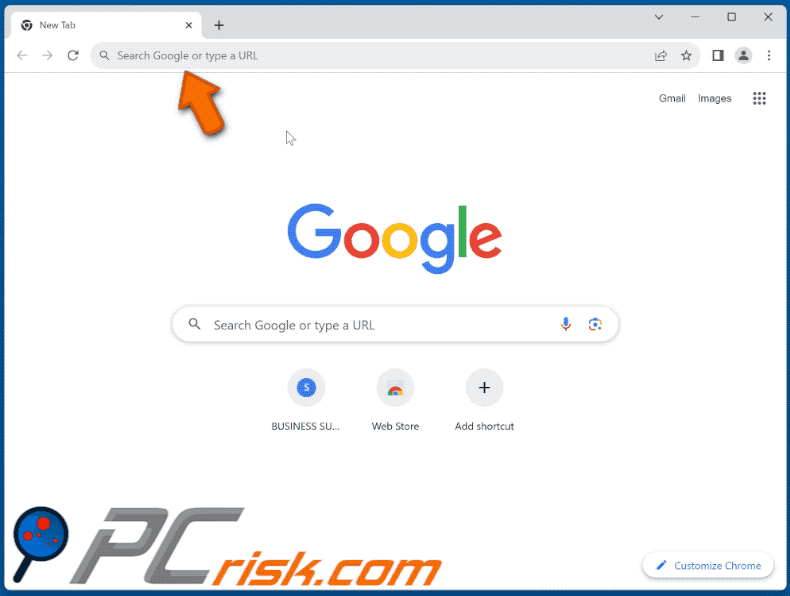
Screenshot of another Facebook page-themed phishing message promoting an identical website:
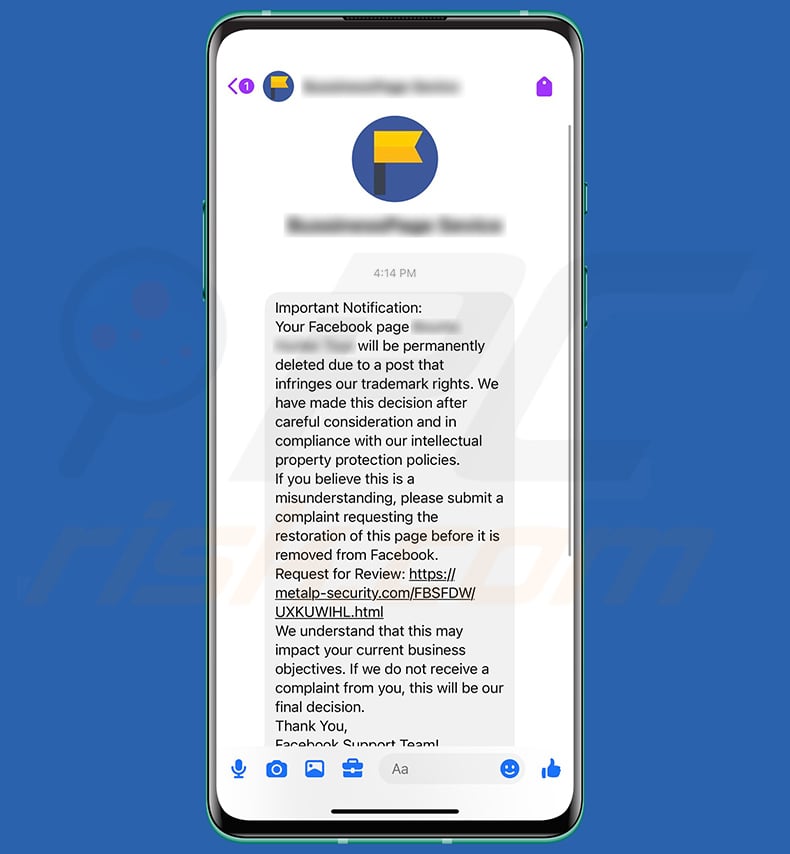
Text presented within:
Important Notification:
Your Facebook page - will be permanently deleted due to a post that infringes our trademark rights. We have made this decision after careful consideration and in compliance with our intellectual property protection policies.
If you believe this is a misunderstanding, please submit a complaint requesting the restoration of this page before it is removed from Facebook.
Request for Review: -
We understand that this may impact your current business objectives. If we do not receive a complaint from you, this will be our final decision.
Thank You,
Facebook Support Team!
Screenshot of yet another Facebook page-themed scam message promoting a phishing site:
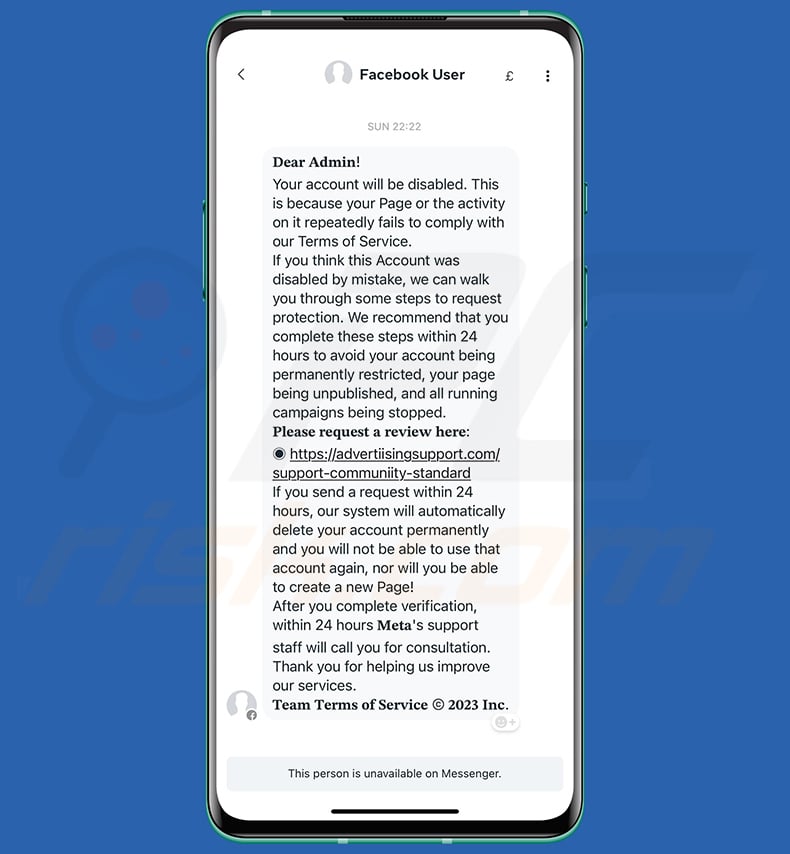
Text presented within:
Dear Admin!
Your account will be disabled. This is because your Page or the activity on it repeatedly fails to comply with our Terms of Service.
If you thinks this Account was disabled by mistake, we can walk you through some steps to request protection. We recommend that you compete these steps within 24 hours to avoid your account being permanently restricted, your page being unpublished, and all running campaigns being stopped.
Please request a review here:
-
If you send a request within 24 hours, our system will automatically delete your account permanently and you will not be able to use that account again, nor will you be able to create a new Page!
After you complete verification, within 24 hours Meta's support staff will call you for consultation.
Thank you for helping us improve our services.
Team Terms of Service © 2023 Inc.
Screenshot of the promoted phishing site:
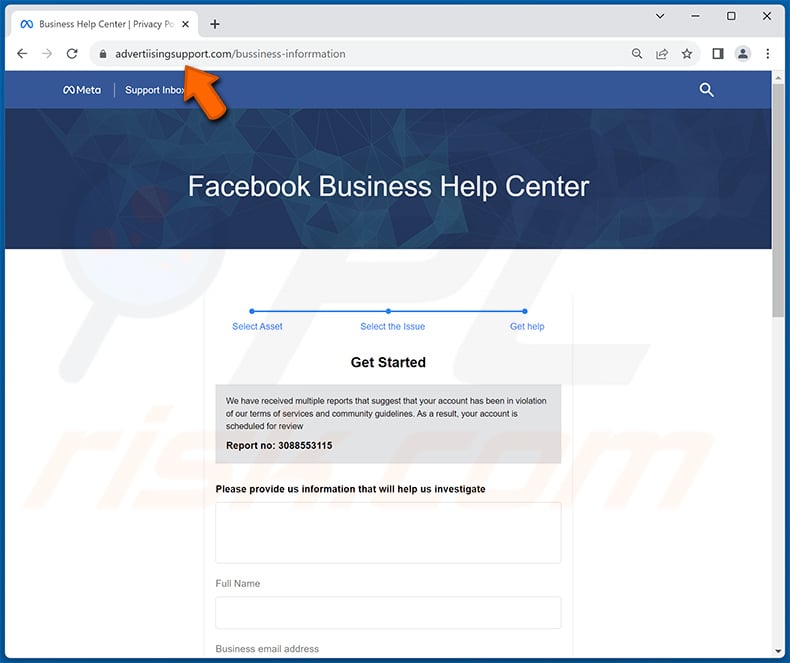
Examples of other websites promoting "Facebook Page Has Infringed Copyright Information" scam:
Sample 1 (livechat.appeal-meta-support[.]com):
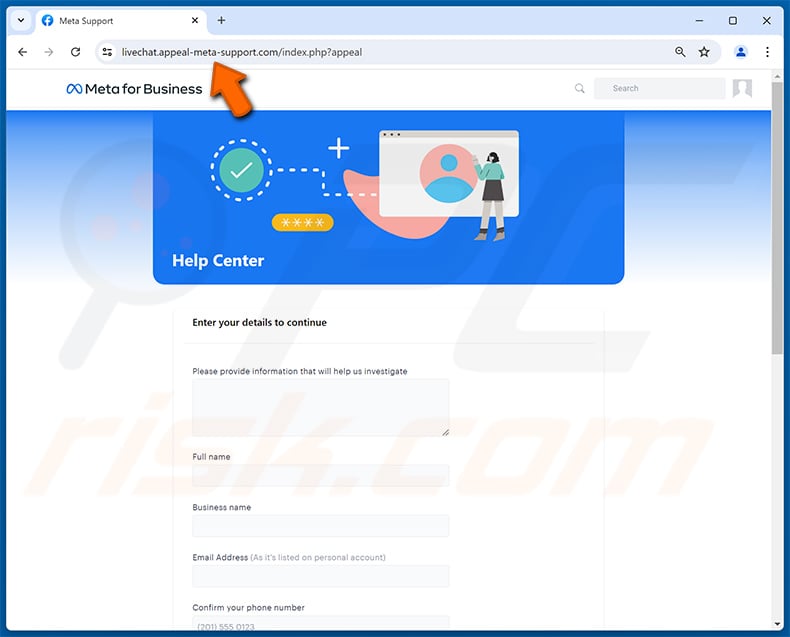
Sample 2 (account.metasystemhelp[.]com):
![Phishing site (account.metasystemhelp[.]com) promoted using Facebook Page Has Infringed Copyright Information scam](/images/stories/screenshots202412/facebook-page-has-infringed-copyright-information-scam-update-2024-12-12-phishing-site.jpg)
Sample 3 (meta-complaint-misconduct.pages[.]dev):
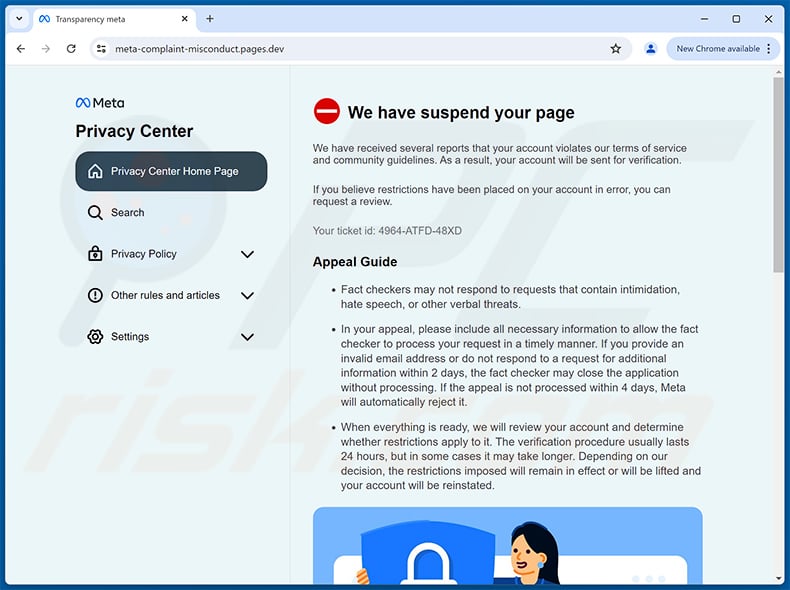
Screenshot of a spam email promoting a scam page claiming that the recipient's Facebook account will be deleted due to certain policies' violation:
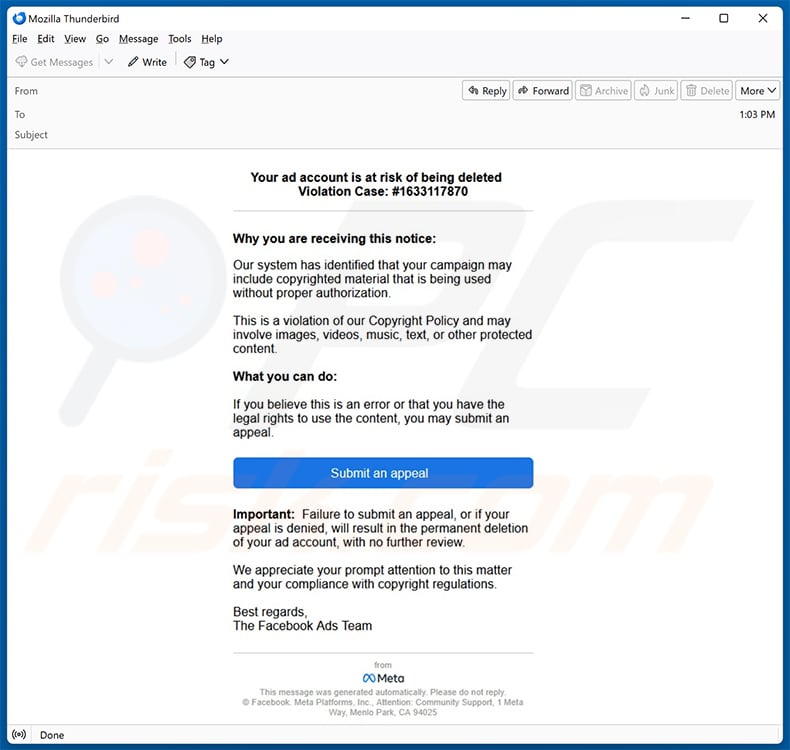
Text presented within:
Your ad account is at risk of being deleted
Violation Case: #1633117870Why you are receiving this notice:
Our system has identified that your campaign may include copyrighted material that is being used without proper authorization.
This is a violation of our Copyright Policy and may involves images, videos, music, text, or other protected content.
What you can do:
If you believe this an error or that you have the legal rights to use the content, you may submit an appeal.
Submit an appeal
Important: Failure to submit an appeal, or if your appeal is denied, will result in the permanent deletion of your ad account, with no further review.
We appreciate your prompt attention to this matter and your compliance with copyright regulations.
Best regards,
The Facebook Ads Team
Screenshot of the promoted scam page:
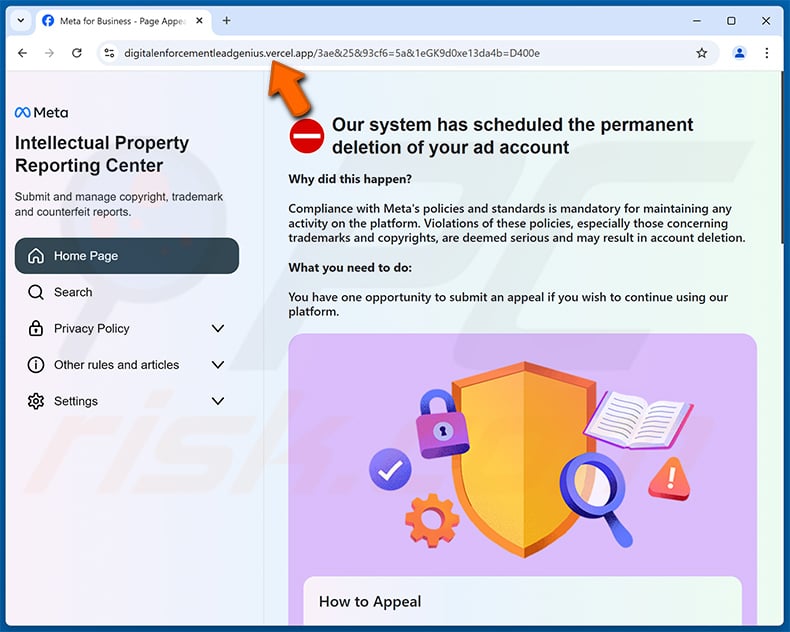
Instant automatic malware removal:
Manual threat removal might be a lengthy and complicated process that requires advanced IT skills. Combo Cleaner is a professional automatic malware removal tool that is recommended to get rid of malware. Download it by clicking the button below:
DOWNLOAD Combo CleanerBy downloading any software listed on this website you agree to our Privacy Policy and Terms of Use. To use full-featured product, you have to purchase a license for Combo Cleaner. 7 days free trial available. Combo Cleaner is owned and operated by RCS LT, the parent company of PCRisk.com.
Quick menu:
- What is Facebook Page Has Infringed Copyright Information smishing scam?
- Types of malicious emails.
- How to spot a malicious email?
- What to do if you fell for an email scam?
Types of malicious emails:
![]() Phishing Emails
Phishing Emails
Most commonly, cybercriminals use deceptive emails to trick Internet users into giving away their sensitive private information, for example, login information for various online services, email accounts, or online banking information.
Such attacks are called phishing. In a phishing attack, cybercriminals usually send an email message with some popular service logo (for example, Microsoft, DHL, Amazon, Netflix), create urgency (wrong shipping address, expired password, etc.), and place a link which they hope their potential victims will click on.
After clicking the link presented in such email message, victims are redirected to a fake website that looks identical or extremely similar to the original one. Victims are then asked to enter their password, credit card details, or some other information that gets stolen by cybercriminals.
![]() Emails with Malicious Attachments
Emails with Malicious Attachments
Another popular attack vector is email spam with malicious attachments that infect users' computers with malware. Malicious attachments usually carry trojans that are capable of stealing passwords, banking information, and other sensitive information.
In such attacks, cybercriminals' main goal is to trick their potential victims into opening an infected email attachment. To achieve this goal, email messages usually talk about recently received invoices, faxes, or voice messages.
If a potential victim falls for the lure and opens the attachment, their computers get infected, and cybercriminals can collect a lot of sensitive information.
While it's a more complicated method to steal personal information (spam filters and antivirus programs usually detect such attempts), if successful, cybercriminals can get a much wider array of data and can collect information for a long period of time.
![]() Sextortion Emails
Sextortion Emails
This is a type of phishing. In this case, users receive an email claiming that a cybercriminal could access the webcam of the potential victim and has a video recording of one's masturbation.
To get rid of the video, victims are asked to pay a ransom (usually using Bitcoin or another cryptocurrency). Nevertheless, all of these claims are false - users who receive such emails should ignore and delete them.
How to spot a malicious email?
While cyber criminals try to make their lure emails look trustworthy, here are some things that you should look for when trying to spot a phishing email:
- Check the sender's ("from") email address: Hover your mouse over the "from" address and check if it's legitimate. For example, if you received an email from Microsoft, be sure to check if the email address is @microsoft.com and not something suspicious like @m1crosoft.com, @microsfot.com, @account-security-noreply.com, etc.
- Check for generic greetings: If the greeting in the email is "Dear user", "Dear @youremail.com", "Dear valued customer", this should raise suspiciousness. Most commonly, companies call you by your name. Lack of this information could signal a phishing attempt.
- Check the links in the email: Hover your mouse over the link presented in the email, if the link that appears seems suspicious, don't click it. For example, if you received an email from Microsoft and the link in the email shows that it will go to firebasestorage.googleapis.com/v0... you shouldn't trust it. It's best not to click any links in the emails but to visit the company website that sent you the email in the first place.
- Don't blindly trust email attachments: Most commonly, legitimate companies will ask you to log in to their website and to view any documents there; if you received an email with an attachment, it's a good idea to scan it with an antivirus application. Infected email attachments are a common attack vector used by cybercriminals.
To minimise the risk of opening phishing and malicious emails we recommend using Combo Cleaner Antivirus for Windows.
Example of a spam email:

What to do if you fell for an email scam?
- If you clicked on a link in a phishing email and entered your password - be sure to change your password as soon as possible. Usually, cybercriminals collect stolen credentials and then sell them to other groups that use them for malicious purposes. If you change your password in a timely manner, there's a chance that criminals won't have enough time to do any damage.
- If you entered your credit card information - contact your bank as soon as possible and explain the situation. There's a good chance that you will need to cancel your compromised credit card and get a new one.
- If you see any signs of identity theft - you should immediately contact the Federal Trade Commission. This institution will collect information about your situation and create a personal recovery plan.
- If you opened a malicious attachment - your computer is probably infected, you should scan it with a reputable antivirus application. For this purpose, we recommend using Combo Cleaner Antivirus for Windows.
- Help other Internet users - report phishing emails to Anti-Phishing Working Group, FBI’s Internet Crime Complaint Center, National Fraud Information Center and U.S. Department of Justice.
Frequently Asked Questions (FAQ)
Why did I receive this fraudulent message?
Scammers frequently employ automated tools to produce and dispatch a high volume of messages indiscriminately. If your contact details are publicly accessible or have been disclosed online, there is a chance you could be randomly chosen as a target.
I have provided my personal information when tricked by this scam, what should I do?
If you have fallen victim to a scam and provided your Facebook account login credentials, change your password to a strong and unique one, enable two-factor authentication for an added layer of security, and review your account settings for any unauthorized changes. Also, report the incident to Facebook through their support channels to alert them of the compromise and follow any further instructions they provide.
I have downloaded and opened a malicious file attached to an email or other message, is my computer infected?
If the file opened file is executable, the likelihood of infection is high. However, if it is a document like .pdf or .doc, there is a chance you may have evaded the infection, as merely opening the document is not always sufficient for malware to compromise a computer.
I have read the message but did not open the attachment, is my computer infected?
Merely opening a message or email poses no inherent threat. The risk arises when users click on links or open attached files, as these actions can lead to system infections.
Will Combo Cleaner remove malware infections that were present in email attachment?
Combo Cleaner has the capability to find and eradicate nearly all recognized malware infections. It is important to note that sophisticated malware can be hidden deep in the system. Therefore, performing a full system scan is imperative for complete removal.
Share:

Tomas Meskauskas
Expert security researcher, professional malware analyst
I am passionate about computer security and technology. I have an experience of over 10 years working in various companies related to computer technical issue solving and Internet security. I have been working as an author and editor for pcrisk.com since 2010. Follow me on Twitter and LinkedIn to stay informed about the latest online security threats.
PCrisk security portal is brought by a company RCS LT.
Joined forces of security researchers help educate computer users about the latest online security threats. More information about the company RCS LT.
Our malware removal guides are free. However, if you want to support us you can send us a donation.
DonatePCrisk security portal is brought by a company RCS LT.
Joined forces of security researchers help educate computer users about the latest online security threats. More information about the company RCS LT.
Our malware removal guides are free. However, if you want to support us you can send us a donation.
Donate
▼ Show Discussion